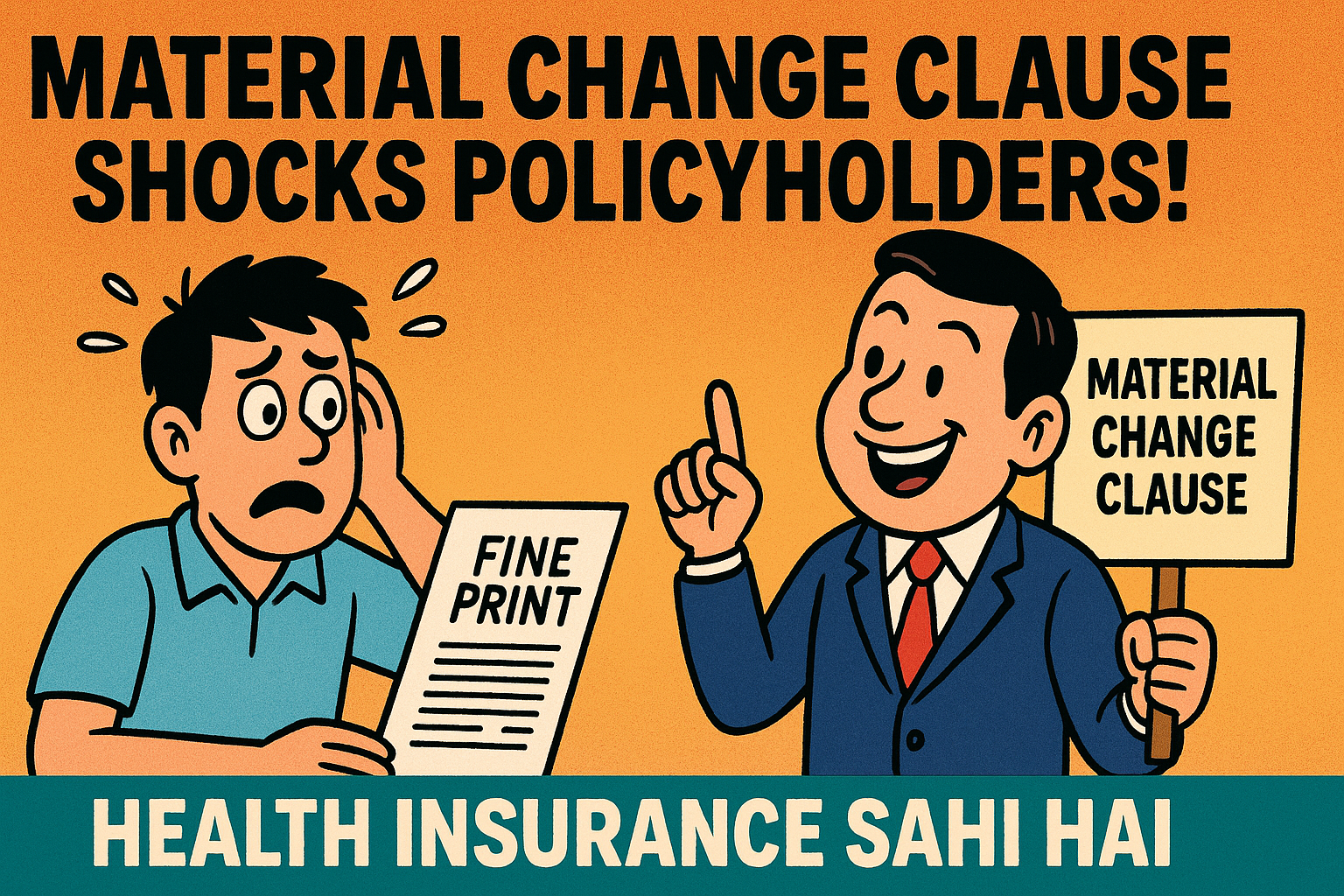Here’s a summary of the controversy around the “material change” clause in the health insurance plan by ICICI Lombard General Insurance Company Limited (specifically the “Elevate” policy) — what it is, why many are concerned, and how ICICI Lombard has responded.
What is the “Material Change” Clause?
- In the policy wording of the Elevate plan the clause reads:
“The Insured Person shall notify the Company in writing of any material change in the risk in relation to the declaration made in the proposal form or medical examination report at each Renewal and the Company may, adjust the scope of cover and/or premium, if necessary, accordingly.” - In plain terms: After the policy is issued, if the insured person’s risk profile changes (for example, a new illness or condition emerges), the insurer reserves the right to revisit the cover or premium at renewal.
- The clause thereby triggers a requirement on the insured to inform the insurer of “material change” and gives the insurer an option to adjust terms.
Why the Controversy?
Several consumer-protection experts and media outlets have pointed out problems with this clause in the context of India’s health insurance regulatory regime. Here are the key issues:
- Conflict with lifelong renewability and no fresh underwriting rules
- By regulation, health insurance policies in India must offer lifelong renewability (unless due to fraud, mis-representation, etc.).
- Insurers are not supposed to do “fresh underwriting” at renewal simply because the insured has developed a new condition (unless sum insured is increased).
- The critique: A clause that allows adjustment of cover/premium based on new conditions potentially undermines this guarantee.
- Selective application risk
- The concern is that such a clause might be used selectively (for policyholders who fall ill) to increase premium or restrict coverage — which would be unfair and arguably ultra vires (beyond the insurer’s power under IRDAI rules).
- For example: if someone gets diagnosed with a serious disease after policy inception, the insurer might invoke this clause to raise premium or reduce benefits — thus penalising the person when they most need cover.
- Ambiguity and disclosure burden on policyholder
- Many policyholders may not be aware of the implication of such a clause. It shifts the burden in effect onto the policyholder to declare “material changes” at renewal.
- The term “material change in risk” is itself vague and open to interpretation (what qualifies as material? When must it be disclosed?).
- Regulatory process concerns
- Some commentators note that under a “use and file” regime (insurers can launch products then subsequently file with regulator) the clause may have slipped in without full prior scrutiny by the regulator.
- If a difference in policy terms is effectively applied only to certain individuals (those who develop illness) rather than uniformly, that may conflict with IRDAI’s product change rules.
ICICI Lombard’s Response
- In an article in Outlook Money, ICICI Lombard reportedly clarified that fresh underwriting or health-based loading will not apply at renewal under the Elevate policy (i.e., they claim that developing a new disease will not trigger a premium increase or reduction in coverage at renewal).
- They emphasised that the material change clause is to cater to changes in risk (for example, a change in lifestyle or location) — not to penalise policyholders who develop illnesses after inception.
My Assessment & What to Watch
- The clause as worded does give the insurer a contractual right to adjust premium or cover “if necessary” in case of material change. That raises a potential risk to policyholders.
- However, the insurer’s clarification suggests they do not intend to use it to penalise policyholders who develop illness post-policy.
- The key will be how the clause is applied in practice:
- Are premium increases or coverage reductions being done selectively or broadly across a product? If selectively, there is regulatory risk.
- Are policyholders required to declare new illnesses at renewal even when the insurer states they will not adjust premium? That remains ambiguous.
- Are disclosures in renewal notices clear and transparent? Policyholders should check renewal documents carefully.
What Should Policyholders Do?
- If you hold the Elevate policy or a similar plan: Read your renewal notice. Does it ask you to declare “any material change in risk”?
- If yes: Ask the insurer in writing (email) for clarification:
- If you developed a new medical condition after policy inception, will the premium or cover be changed at renewal?
- Request written acknowledgement of insurer’s statement that they will not increase premium or reduce cover solely because of such an illness.
- Keep all documents: initial proposal form, policy wordings, renewal notices.
- If you feel you are being discriminated against (premium hike or coverage cut solely because you developed illness), you may raise a grievance with the Insurance Regulatory and Development Authority of India (IRDAI) via its “Bima Bharosa” portal or approach the Insurance Ombudsman.
If you like, I can check how many claims or renewals have actually been affected due to this clause (for this policy and others) and whether any regulatory action has been taken.













